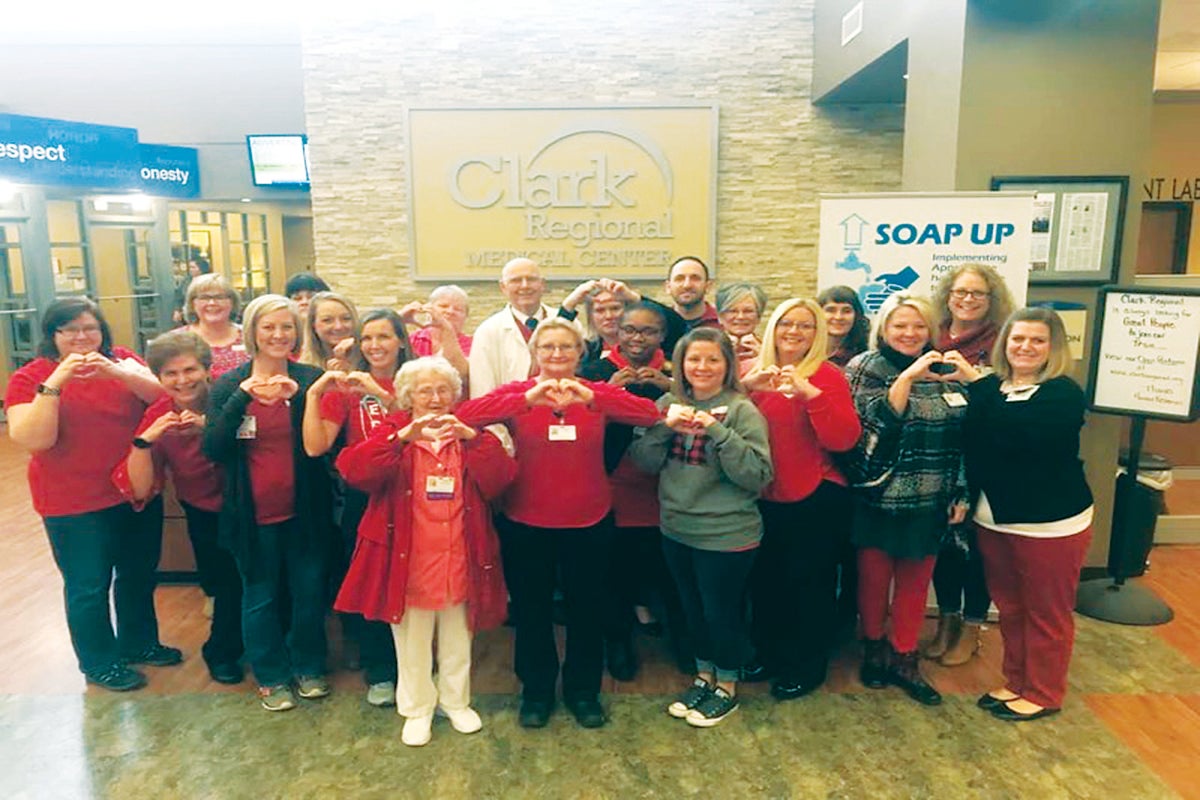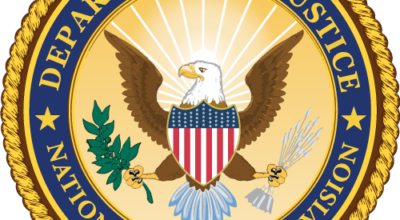Closer Look: Ways to improve heart health
Published 2:59 pm Saturday, February 9, 2019

- Staff at the Clark Regional Medical Center wore red for American Heart Health Month. (Photo submitted)
Listen to your heart.
And your body, Ashley Moore, director of emergency services at Clark Regional Medical Center.
February is American Heart Health Month. Moore said the month is a reminder to folks to take their heart health seriously.
“Know your body,” Moore said. “Know when something’s not right, and know the signs and symptoms of a heart attack.”
Cardiovascular or heart disease is the leading cause of death in women and men, with obesity and diabetes, which increase a person’s risk of heart attack and stroke, on the rise, according to the Center for Disease Control and Prevention.
American Heart Health Month
According to the American Heart Association, American Heart Health is a time to raise awareness about the dangers of heart disease and help people work to reduce their risk of heart attack, stroke and other related complications.
The American Heart Association promotes its vast array of resources and partnerships to provide people with tools to reduce high blood pressure, stress, help them eat better, exercise and other fundamental changes.
Moore said CRMC also hosts a number of informational sessions and events throughout the month to help raise awareness.
Each Friday in February, CRMC will have informational booths relating to heart health set up in the cafeteria from 11 a.m. to 1:30 p.m. CRMC’s cardiac rehab will also have an open house from 1-2 p.m. Feb. 15.
On Feb. 22, CRMC is raising money for the American Heart Association by selling quesadilla lunches in the cafeteria from 11 a.m. to 1:30 p.m.
Importance of heart health
Heart disease is responsible for about one in every four deaths in the U.S., killing more than half a million people each year, according to the CDC.
About 750,000 Americans will have a heart attack this year. Of those, about 116,000 will die.
Heart disease is the leading cause of death for people of most racial/ethnic groups in the United States, including African Americans, Hispanics and whites. For Asian-Americans, Pacific Islanders, Native Americans or Alaska Natives, heart disease is second only to cancer.
Cardiovascular diseases kills more people than all forms of cancer combined, according to the CDC.
In the U.S., someone has a heart attack every 34 seconds, and one person dies every minute from a heart disease-related event.
Heart disease is a broad term used for a variety of diseases of the heart and blood vessels, including coronary artery disease, heart rhythm disease and defects of the heart, according to the CDC.
Most commonly, when referring to heart disease, wellness advocates are targeting coronary artery disease, which is the most common type of heart disease, which kills about 380,000 people each year.
This disease can lead to heart attacks and even sudden cardiac death.
The good news is, despite the high mortality rate, coronary artery disease is highly preventable, according to the CDC.
Know the signs
Someone might have one or more of the common symptoms.
“It can come and go, or it can be constant,” Moore said.
According to Early Heart Attack Care education, the symptoms and pain can become more intense over time.
Tabitha Stepp, a chest pain coordinator at CRMC, said it’s important to stay alert and always pay attention to chest pressure.
Chest pain could suggest a heart attack if coupled with these symptoms:
— Change in heart rhythm
— Feeling of fullness
— Pain that travels down one or both arms
— Jaw pain
— Excessive fatigue or weakness
— Anxiety
— Nausea or vomiting
— Back pain
— Chest pressure, squeezing, aching or burning
— Dizziness
— Shortness of breath
— Upper body discomfort.
General risk factors, which patients need to discuss with a doctor, include chronic chest pain, a family history of cardiovascular disease, high blood pressure, obesity, sedentary lifestyle, using tobacco products, metabolic disease and diabetes.
For women, it can also include birth control pills, a history of pre-eclampsia, gestational diabetes or having a low birth weight baby.
Some heart attack symptoms can be different between men and women. According to EHAC, women may be less likely to seek immediate medical care which can cause more damage to the heart.
Some differences include:
— Men usually feel pain and numbness in the left arm or side of the chest, but in women, these symptoms may appear on the right side.
— Women may feel completely exhausted, drained, dizzy or nauseous.
— Women may feel upper back pain that travels up into their jaw.
— Women may think their stomach pain is the flu, heartburn or an ulcer.
In an atypical presentation, the signs and symptoms are different. According to EHAC, the patient may not complain about pain or pressure.
In that case, people should be alert for a sharp or “knifelike” pain that occurs with coughing or breathing, pain that spreads above the jawbone or into the lower body and difficult or labored breathing.
“Educating yourself on knowing those signs and symptoms and knowing when to come to the emergency room … That’s what most important,” Moore said.
Survive. Don’t drive.
Moore said if anyone notices signs of a heart attack, call 911 immediately. She said people should not try to drive if they have any symptoms similar to those of a heart attack.
“No matter what, you need to seek care at your local emergency room,” Moore said.
At CRMC, Moore said they would take patients back to the treatment room and get them evaluated immediately by an emergency room physician. She said CRMC works closely with the University of Kentucky cardiology team.
“We want you to know when to call 911 and know your body and know when something’s not right,” Moore said. “Come let us help you survive a heart attack.”
Stepp said it’s crucial never overlook chest pain or discomfort. CRMC offers an accredited chest pain facility.
How to make lifestyle changes
Overall, Moore said reducing the risk, excluding those with family history, comes down to changing a person’s lifestyle.
“Heart health means a whole lot more to some people,” Moore said. “It’s about eating your fruit and veggies and doing all of that.”
Some ways to make the change, according to the Heart Foundation:
— Quit smoking, this includes e-cigarettes, and avoid recreational drug use.
— Maintain a healthy weight.
— Start moving. Exercise for at least 30 minutes five days a week or start walking around the block daily. Find a low-impact, beginner workout video for free online. In addition to physical benefits, aerobic exercise such as walking, jogging or biking is shown to increase cognition and brain function in adults of all ages.
— Eat a healthy diet and avoid trans fats. Eat whole foods and limit all sugary drinks which include diet beverages. Also steer clear of fried food and processed foods. Consider steamed vegetables with lean protein such as chicken or fish, whole wheat pasta with vegetables, snacks such as nuts or an apple with peanut butter or almond butter that’s not heavily sweetened.
— Treat your other health conditions, especially if you have high blood pressure, high cholesterol and diabetes.
— Reduce stress.
— Take fish oil supplements.
— High-risk individuals should consider taking a daily aspirin.
Making heart-healthy choices, knowing family health history and the risk factors for heart disease, having regular checkups and working with your physician to manage your health are all integral aspects of saving lives from this often silent killer.
Moore said despite the risk factors, people who are seemingly in good health can have a heart attack too. It’s all about listening to your body, she said.
What CRMC offers to help
Patients can complete angio screenings at CRMC.
It takes less than 20 minutes to complete an angio screening, from initial paperwork to a printed report with data, images and a CD of information for the patient’s regular doctor. In less than half an hour, the screening can find potentially lifesaving medical information for patients.
Moore said CRMC has offered the screenings for about two years, both in the hospital every month or at local businesses. The test covers many checks, including blood pressure, body mass index, an EKG, heart rate and an ultrasound of the carotid arteries in the patient’s neck.
In many instances, the screenings have uncovered heart problems or other situations the patient didn’t know existed, she said.
The hospital offers the screenings on the first Tuesday of the month, though they can be scheduled off-site at area companies, she said. Patients can pay for the testing can with flexible spending or insurance. CRMC offers the screenings for $40.
CRMC also offers cardiopulmonary rehabilitation to improve the quality of life for individuals diagnosed with heart and lung disease.
Tara Bentley, who works in the cardiac rehab program, said it offers individualized, exercise-based rehabilitation overseen by a full team including a physician, a nurse, a respiratory therapist, an occupational therapist and a physical therapist.
Bentley said the comprehensive program helps patients recover from procedures and make lasting changes for a healthier and happier life.
Bentley said she’d had patients in their 30s to 90s.
“It’s very individualized,” Bentley said.
The program includes:
— In-depth meeting with staff and review of medical information;
— Preliminary six-minute walk test;
— Regular appointments for two to three times per week for three months;
— Supervised exercise; and
— Education for lifestyle modifications, including diet and exercise.
“We want you to make this is a lifestyle change,” Bentley said.
Again, Stepp stressed heart health comes down to listening to your body.
“If you feel that something is wrong, it’s so important to call 911,” Stepp said. “ … Early recognition and early treatment are key to surviving.”






